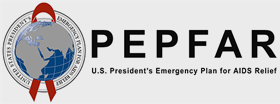Nigeria began the diagnostic network optimization (DNO) journey in 2017, and by March 2018, the country had made appreciable progress, streamlining the number of molecular laboratories from 27 to 17 according to optimization recommendations from the DNO exercise. The country also acquired high-throughput equipment platforms.
Additionally, Nigeria established a specimen referral network — the National Integrated Specimen Referral Network (NiSRN) — which contracted with private third-party logistics companies for specimen transport services. 3PLs transport viral load (VL), early-infant diagnosis, and CD4 samples for HIV (and sputum samples for TB) from referring facilities to testing laboratories and return results physically through the same transport methods or electronically through the laboratory information management system (LIMS).
In 2020, as the COVID-19 pandemic emerged, Nigeria's national laboratory technical working group held discussions with other key partners to consider using existing resources in the country's mega-laboratories — which were set up for the polymerase chain reaction (PCR) analysis of HIV specimens — for integrating COVID-19 testing.
Piloting COVID-19 testing integration with VL and HPV
The Nigeria Centre for Disease Control (NCDC) piloted COVID-19 integration in three laboratories — two in Abuja that had four Roche COBAS 8800 platforms and one in Lagos that had one COBAS 6800 and one COBAS 8800. The laboratories used these machines for HIV VL and human papillomavirus (HPV) testing.
To conduct the pilot, the NCDC first developed a protocol to incorporate SARS-CoV2 assays into the equipment at the three laboratories, then conducted verification on the equipment to ensure the machines were ready to run the assays.
At the same time, the NCDC – with support from the U.S. Centers for Disease Control and Prevention – provided staff training to run the SARS-CoV2 assays. Staff also received instructions on COVID-19 safety measures for themselves and their families.
Next, the laboratory technical working group collaborated with other stakeholders to integrate SARS-CoV-2 into the LIMS.
The three laboratories adjusted workflows to introduce shift duty to enable integration of COVID-19 testing and multitasking. Dedicated sample racks for VL, HPV, and SARS-CoV2 testing were also installed for efficiency. After a couple of weeks, staff adjusted fully to the integration of COVID-19 testing.
For the NiSRN sample transportation, pickup personnel received training on how to handle the COVID-19 test samples to integrate into the existing protocols.
Within six months of the pilot's completion, the NCDC activated 87 public laboratories and nine private-sector laboratories for COVID-19 testing, helping the country rapidly increase access to testing to curb COVID-19's spread.
Benefits of COVID-19 integration
Integrating COVID-19 testing with VL and HPV testing helped avoid duplication of investment in infrastructure and laboratory supporting systems, such as specimen transport, supply chain management, and information systems.
It also made more efficient use of existing human resources, laboratory space, and commodities common to all three tests.
Finally, it simplified specimen transport and results delivery.
Challenges
Some challenges were encountered as well, including an increase in work volume for staff with no extra remuneration, leading to some reluctance among staff to take on the extra workload. More sample testing racks were also needed. The country also had to be accountable to different partners that supported different testing.
To mitigate the staffing and testing rack challenges, the country recruited more staff and added sufficient racks.

GHSC-PSM is currently working on an update to the groundbreaking resource A Network Approach to Scaling Up Laboratory Services, for publication next year. This World AIDS Day, we are sharing a few ‘sneak peeks’ of the new content, including these two case studies from Nigeria and Rwanda that show how COVID-19 testing was integrated with existing platforms for measuring HIV viral load.
Before the COVID-19 pandemic, Rwanda's laboratory network had been optimized through a DNO process to improve access to HIV VL, early-infant diagnosis, and CD4 testing and improve their efficiency and cost effectiveness. Laboratory instruments were placed at optimal locations to reduce turnaround time (TAT) for test results. As a result, the TAT for VL testing reduced from 14 to seven days.
When the COVID-19 pandemic took hold in 2020, the country needed to determine how to incorporate COVID-19 testing into its existing laboratory system. As an immediate response, the government quickly redesigned the immunovirology section of the National Reference Laboratory (NRL) to serve as a testing site. The GeneXpert and Abbott M2000 platforms available in this section were used to conduct COVID-19 PCR tests.
But with a large and growing number of COVID-19 testing samples being collected from facilities throughout the country and only one testing site, the TAT for results was long and the NRL was overwhelmed.
The M2000 machines were also available in several other facilities and being used for VL testing. The Ministry of Health, through the NRL, expanded testing to these sites as well. Integrating COVID-19 testing at these sites was an efficient transition because laboratory staff were already experienced with the platforms; the primary change was the COVID-19-specific reagents that needed to be used to run PCR tests. With the addition of these sites, the TAT for COVID-19 PCR tests fell from 72 hours to 24 hours or less.
Currently, COVID-19 PCR tests are conducted at 10 sites equipped with Biorad platforms for amplification and Maxwell Maxprep machines for extraction. Additionally, all public health facilities and 114 accredited private clinics provide rapid testing for COVID-19.


